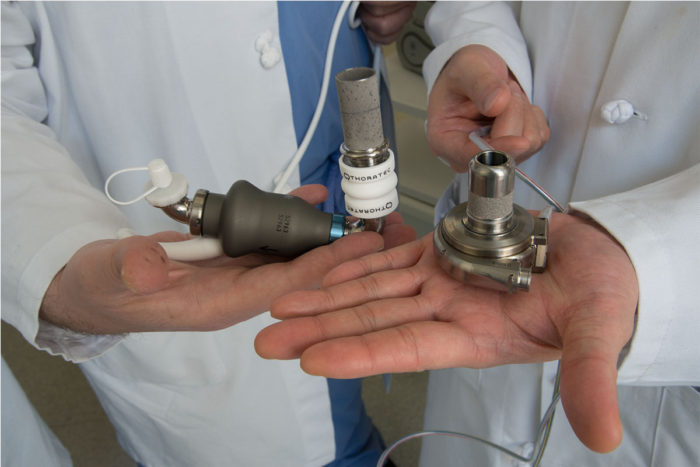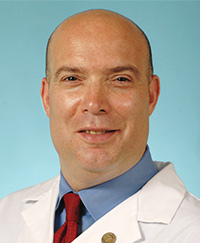The role of ventricular assist devices expanding
A multi-center trial will help determine if devices that assist the heart could help patients with heart failure more than standard therapies

Surgeons hold a ventricular assist device (VAD).
A new study is evaluating a left ventricular assist device (LVAD) as a tool to benefit a broader range of patients with heart failure. The REVIVE-IT (Randomized Evaluation of VAD InterVention Before Inotropic Therapy) clinical trial will compare the Heartmate II LVAD, which helps the heart pump blood, to optimal medical management in patients who have advanced heart failure but who would not ordinarily be considered for an LVAD or cardiac transplantation. The potential impact of this inquiry is significant: an estimated 4.8 million Americans have congestive heart failure. In patients over age 65, it is the first-listed diagnosis and is responsible for one-fifth of all hospitalizations in that group, according to the National Institutes of Health (NIH).
“Left ventricular assist devices have typically been used in patients at the end of life as a bridge to transplant or as a destination therapy to prolong quality of life,” says Douglas Mann, MD, chief of cardiology at Washington University and Barnes-Jewish Hospital and chair of the REVIVE-IT national steering committee. “The goal of this study is to use the same devices to intervene earlier to try to stabilize the disease process and perhaps have an impact on recovery, improving the heart failure enough that it can be managed on medications without the need for circulatory support. The device could become a temporary therapy in the future.”
He emphasizes that REVIVE-IT is small, more accurately called a feasibility or pilot study, to give direction for a future larger trial. With only 50 patients randomly assigned to the LVAD group, the two-year trial will not likely show a difference in mortality. More patients and a longer time frame would be needed for that, Mann says. He and colleagues are looking for a difference in the disease process and quality of life. The VAD group will be compared to the other 50 patients, who will receive optimal medical management, including heart failure medications and devices such as implanted bi-ventricular pacers and defibrillators.
Principle investigators for the Washington University site are Greg Ewald, MD, chief of clinical cardiology and medical director of the cardiac transplant program at Barnes-Jewish Hospital; and cardiac surgeon Scott Silvestry, MD, surgical director of the heart transplant and mechanical circulatory support programs at Washington University and Barnes-Jewish.

Silvestry heads up the surgical team for the study. As one of the nation’s leading VAD implant centers—among a handful in the country heavily involved in testing the devices—Washington University Medical Center is uniquely qualified to participate in the trial, Silvestry says. He has been using VADs for more than 15 years; in 2012, surgeons at Barnes-Jewish implanted 101 of the devices in end-stage patients.
Historically, Silvestry says, LVADs have been used when the patient is severely limited by heart failure, when medications aren’t helping or are not well tolerated, and when the patient is sick enough to qualify for the heart transplant waiting list. “The next frontier for VADs is defining the benefit to patients earlier than they’ve been used in the past. We’d like to help patients avoid the ravages of heart failure and reclaim their lives. If we can accomplish this, it will be a major step forward in treating this devastating condition,” says Silvestry.
The REVIVE-IT trial
The two-year study has two parts: a trial and a registry. The trial is open to heart failure patients over the age of 21 who meet inclusion criteria. Patients who fail eligibility assessments are entered into the prospective, observational multi-center registry to collect information on their heart failure and to evaluate how this information is related to the course of the illness over a two- to five-year period.
Researchers have long thought that newer generations of small, continuous-flow VADs for heart failure recovery could have wider applications. The results of REVIVE-IT may fuel future trials to extend the usefulness of these devices more routinely to patients with less advanced heart failure who are not doing well on conventional therapy.
Silvestry hopes that REVIVE-IT and subsequent studies will demonstrate that earlier use of this device can help patients function at higher levels and extend longevity.
To refer a patient, please call the Doctor’s Access Line at 314-747-3251 or the Heart Failure and Heart Transplant Office at 314-454-7687.






